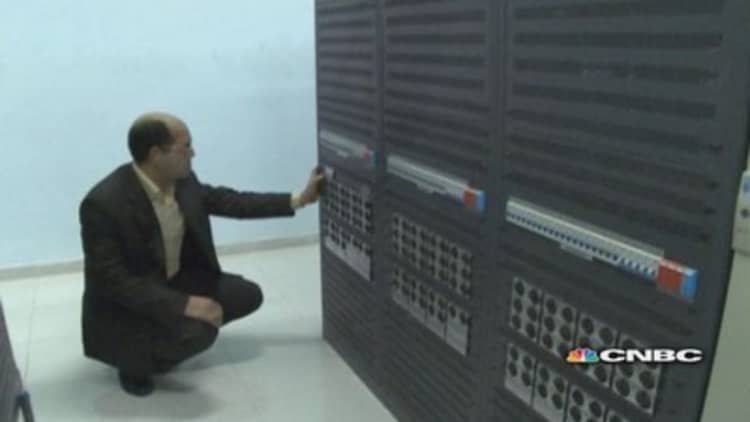The sleepy Egyptian village of Abu Talat is a grueling four-hour road trip from Cairo, and hardly gives the impression of housing critical telecom infrastructure that connects hundreds of millions of users to the Internet across Asia and Europe.
But underneath it lies a 40 Gigabits per second (Gbps) submarine cable dubbed "Telecom Egypt North" or "TE North". This was commissioned by Telecom Egypt in a 2008 deal with Alcatel-Lucent worth $125 million. It ties Abu Talat to the French coastal city of Marseille via a 2240-mile fiber optic connection, which passes through Egypt's domestic network and onwards to Asia.
CNBC was given rare, exclusive access to the facility, which is housed in a small, well-hidden compound behind layers of army security. Schoolchildren play wistfully outside of its walls, and an older kiosk owner watches on as he waits for his next customer.
Inside, it's fairly straightforward. There's a room with servers and the red, prominently-labelled "TE North" cable. There's a smaller room for operations, in which engineers clamor for the many monitors displaying vast amounts of data, plus another with hundreds of batteries, used as a backup in case of power failure.
Read MoreEgyptians vote to bring unrest to an end
Worldwide, undersea cables carry 99 percent of intercontinental Internet traffic and one of the busiest hubs is Egypt.
"Eighteen discrete submarine cables land on these shores, connecting Asia to Europe," Mohamed El-Nawawy, CEO of Telecom Egypt, told CNBC in an exclusive interview. "A typical country would have one or two cables."

Apart from small areas off the coast, the submarine cables are often close to the surface of the seabed. And if you thought they would be large and heavy, you'd be surprised. They are less than a couple of inches in diameter, even with stacked armour.
In March 2013, Egypt's Internet connectivity was severely disrupted after an undersea cable was severed. The damage of the outage extended around the world, from Saudi Arabia to Singapore. There were reports of intentional sabotage.
El-Nawawy said incidents of accidental disruption by commercial vessels were also common in Egypt. In fact, the company has received $12.5 million in compensation after an incident, with a ship known only as "B-Elephant".
"It's a passage way with several ships passing through and having many cables, there is always a chance that something would happen," El-Nawawy explained.
Read MoreDivers caught trying to cut Egypt's undersea internet cable
Egypt's Internet connection has also been knocked out by the government in the past. On January 28, 2011, the world was stunned when the government switched off mobile phone networks and the Internet in a futile attempt to contain growing street protests.
Although Telecom Egypt manages much of the country's telecom infrastructure, El-Nawawy said the company had no choice but to comply with the government in the circumstances.
"As is in the laws of many countries, the government has the right to take over operations in certain conditions," he said, explaining that Telecom Egypt had not even received a warning as to what would happen.
"They (the government) did not send an email. We just found out the hard way."
You can watch the full interview with Mohamed El-Nawawy, CEO of Telecom Egypt here. Find out what he plans to do with the firm's stake in Vodafone Egypt, and why he is confident Egypt's government will not fall again within a year.

